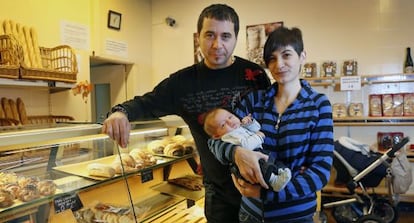Out-of-work couple become accidental bakers thanks to stranger’s donation
Businessman in Barcelona hands over property to struggling parents


Jordi Cabau slices a baguette, deftly making a slanted cut even though it’s only been six weeks since he took over the Santa Clara bakery in Manresa, Barcelona. He was a construction worker until nine months ago, when he joined the ranks of the millions of unemployed in Spain.
The crisis caught him and his partner, Raquel Pérez, at the worst possible time: she had just lost her job as well, and she had found out that she was pregnant. As they were ineligible for welfare checks, the couple ended up living in a shelter home. That is where Raquel gave birth, two months ago.
And then their luck changed. A local businessman decided to anonymously give them an unused bakery — and the business has helped them to turn their lives around.
In a not so distant past — just 10 months ago — Jordi and Raquel had managed to avoid the effects of the economic crisis. He was a self-employed 46-year-old who jumped from job to job in the already-depressed construction industry. But then the work stopped coming in April. A month before that, Raquel, 31, had lost her position at a restaurant in a ski resort in Andorra. Her contract did not get renewed at the end of the season.
Ineligible for welfare checks, the couple ended up living in a shelter home
Because Jordi is self-employed, he was not entitled to unemployment checks. Neither was Raquel: “I was paying social security in Andorra, and could not apply for aid either there or [in Spain].”
It was just when they had both lost their jobs that Raquel found out she was pregnant. Finding themselves without income, the couple decided to move in with her father in Sant Vicenç de Castellet. But that only lasted four months. There were four other people living in the same house, trying to make do with the father’s pension plus the monthly 426-euro check that Jordi’s dad gets, as a member of a low-income household.
“The situation was very precarious, we had nothing there,” says Jordi, who explains how he had to sell his beloved guitars to put food on the table.
But Asier kept growing inside his mother’s belly, and his parents were getting increasingly desperate for solutions.
“At first it was awful, we weren’t finding any help. The social services at Sant Vicenç gave us advice, such as using old-fashioned cloth diapers to save money,” says Jordi.
Raquel was so anxious that she developed complications with her pregnancy, and had to be admitted into hospital. That is where their luck started to change. Social workers at the medical center told the couple about the Rosa Oriol Foundation and its shelter homes, where they stayed until Raquel gave birth.
Jordi eventually had to sell his beloved guitars to put food on the table
A businessman from Manresa happened to read about their story in a local newspaper and got in touch with them. He wanted to donate an unused property, which included both a bakery business and a home.
“I couldn’t believe it,” explains Jordi, speaking in awed tones. “I could imagine finding a job again, but not running a business.” The angel entrepreneur, who asked to remain anonymous, also helped them purchase the first consignment of items they needed to get the bakery going. “Some things we got for free or cheap thanks to his mediation.”
The conversation is interrupted. A group of five people has walked in. They buy three chocolate buns and a packet of salt. The total is 2.94 euros. “That’s it? You’re sure you added it up right?” asks one of them, looking surprised.
But it is. The new bakers have decided to put very popular prices on their products. “This neighborhood is very run down,” explains Jordi. “There are a lot of immigrants here and many are having a hard time. The other day an elderly woman came in asking me for a loaf of bread to eat and so I just gave it to her. Our margins are very low, but we are here to work, not to make money,”
There are lots of shuttered stores on the street where the bakery is located. The couple knows that it will be hard to make the business work. “But no matter how little we have, it is still good compared with what we had two months ago.”
Raquel was so anxious that she developed problems with her pregnancy
Their immediate goals are to save a little to refurbish the living quarters in the back of the store. For now they are still sleeping at the residence run by the Rosa Oriol Foundation, which was created by the Tous family, known for their popular bear-shaped jewelry products. The Tous company is headquartered in Manresa, and the town’s entire civil charity network revolves around this family and a nun named Lucía Caram, who was born in Argentina and belongs to the Order of Saint Clare. Since 2008, Sister Caram has been in charge of organizing the foundation’s food-distribution and shelter network.
The foundation was created in 2010, and now sees to the needs of around 1,000 people. Its main activity is running a food bank, but it also has several homes that provide temporary shelter for the needy. Ramon Pla, who coordinates a residence that houses around 15 people, admits that the case of Jordi and Raquel was the result of several factors coming together at once: “There was a businessman who wanted to help, a family that needed assistance and premises that could be turned into a business,” says Pla, who hopes to see similar cases in the future.
“It is one thing to give people food or momentary assistance,” he says, “but it’s quite another to give them a future.”
Tu suscripción se está usando en otro dispositivo
¿Quieres añadir otro usuario a tu suscripción?
Si continúas leyendo en este dispositivo, no se podrá leer en el otro.
FlechaTu suscripción se está usando en otro dispositivo y solo puedes acceder a EL PAÍS desde un dispositivo a la vez.
Si quieres compartir tu cuenta, cambia tu suscripción a la modalidad Premium, así podrás añadir otro usuario. Cada uno accederá con su propia cuenta de email, lo que os permitirá personalizar vuestra experiencia en EL PAÍS.
¿Tienes una suscripción de empresa? Accede aquí para contratar más cuentas.
En el caso de no saber quién está usando tu cuenta, te recomendamos cambiar tu contraseña aquí.
Si decides continuar compartiendo tu cuenta, este mensaje se mostrará en tu dispositivo y en el de la otra persona que está usando tu cuenta de forma indefinida, afectando a tu experiencia de lectura. Puedes consultar aquí los términos y condiciones de la suscripción digital.








































